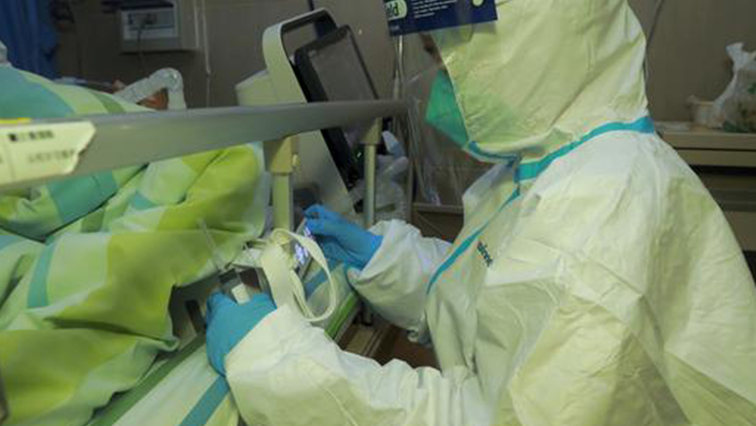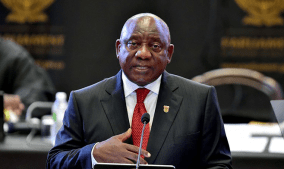Some healthcare workers are self-isolating in an effort to protect their families from coronavirus.
Healthcare workers who are at the forefront of combating COVID-19 say they remain fearful of contracting the virus, while others say they have decided to isolate themselves from their families.
South Africa currently has 927 confirmed coronavirus cases nationally.
COVID-19 UPDATE: South Africa now stands at 927 confirmed cases of the new coronavirus on the eve of #21daylockdownSA . This is an increase of 218 cases from Wednesday 25 March 2020. #StayHomeSA #sabcnews pic.twitter.com/s7kBcbhawO
— SABC News (@SABCNews) March 26, 2020
This as the national lockdown, announced by President Cyril Ramaphosa commences at midnight on Thursday. Healthcare workers who will continue to work throughout the lockdown say, while their emotions are high they will do all humanly possible to contain the virus and save lives.
While millions of South Africans have been forced to stay home in an effort to protect them from the coronavirus the country’s healthcare workers will remain hard at work saving lives. Ramaphosa’s announcement is to minimise movement and give government an opportunity to contain the spread.
Doctors, nurses and surgeons and all healthcare workers in both the public and private sector will stand united on the frontlines of this global war to end the pandemic. However, like every other citizen, healthcare workers too are at risk and like any soldier, they remain fearful for themselves and their families.
We speak to doctors and other specialists about the fears and emotions being on the front line of fighting against the virus.
Preven Doorasamy, a medical laboratory scientist at Florpak Laboratories, says, “It can be termed and likened to a war at this point in time. I think healthcare professionals are finding ourselves in the frontline of this war. The emotions are running high. There is a sense of fear and also a sense of unknown fear, which is purely driven by worldwide news and the stats from hard-hit countries. We look back at our setting and wonder whether SA is equipped and has enough resources to cope with the virus should we be hit just as hard. Us carrying the virus back home. Yes, we are fearful that we might do so. At the same time, we are all highly trained and highly skilled,” says Doorasamy.
Like many others, Doorasamy entered the medical field to save lives. He says South African healthcare professionals are well trained and will go beyond the call of duty to ensure the population is safe.
“We’ve all realised that this is exactly what we subscribed for and we have to put our skill and resources on the line. We have to give everything that we’ve got to assist the SA government to curb and minimise the impact of the virus. The healthcare professionals; yes, we are fearful, but we are going to give our all and ensure that South Africans are kept healthy and safe. We are just appealing to the public to please stay at home,” says Doorasamy.
In this video below the numbers of confirmed cases rises to 927:
For others, the fear and loneliness associated with COVID-19 has begun to consume. A Johannesburg lab worker, who tests hundreds of blood samples daily, says the horror of the possibility of infecting his family has caused him to not return home in weeks.
“We do take the necessary precautions, but it’s difficult sometimes. We have hand sanitizers on desks. You have to clean your surface after every bag of sample. It is scary, but we have to do it. Everyone is scared, obviously. You do take stuff home with you on your phones maybe under your shoes. You can’t let your kids play with your phone because it might be contaminated. You have to change your clothes, go bath. Currently, I am away from the family. I’m not even going home. I’m trying to keep them safe,” says the lab worker.
With 927 people infected in the country, even private hospitals say they have begun running out of resources.
KwaZulu-Natal Lung specialist Dr Leon Naidoo says part of their fear lies in specialists having to practice out of their field of expertise. This father of a two-year-old says he’s taking all the measures he can to avoid infecting his vulnerable family.
“Our major fear is if the disaster hits all at once. The problem like they experienced in the UK, when the ventilators run out. What are we going to do? In the state of emergency, the health minister will use us as doctors first. We are going to have to, at some point, practise out of our field of expertise just to keep patients alive. I think that’s what everyone is scared of as well. We are having to share resources at the moment. A mask that you would use in the ICU, that you would throw away after seeing a patient, you actually have to keep it and use it again. We run the risk of going home, infecting our kids, families. My major concern is, even if I’m asymptomatic, I’m healthy, but what about my in-laws, 2-year-old child. I think that’s a concern that every healthcare worker is scared about,” says Naidoo.
For public healthcare worker, Dr Leanthea Enoch, the key for medical practitioners to remain emotionally strong during the difficult task ahead is to disconnect from the consequences for oneself and rather focus on saving lives.
“We’ve been trained for this. You have to disconnect from what can happen to you otherwise you wouldn’t be able to do your job. I’ve had needle stick injuries, of patients with very high viral loads of HIV. You navigate through that. If we let our fear overcome us, we’ll be paralyzed. We are dealing with something unprecedented in terms of the coronavirus. I leave home every day knowing that on my return journey, things might be different. I have kids, a husband. Protecting them is always a priority. What used to be a normal day of leaving theatre, where you take off your scrubs, wash your hands and leave has turned into a process. I leave theatre meticulous about wiping down everything. The guilt of having been the one that brought this home to my family would be very hard to deal with,” says Enoch.
While millions of South Africans will remain home for the 21-day lockdown period, spare a thought for those at the coalface of battling the coronavirus. Remember to limit your movement and maintain constant hand washing and sanitizing.

Loading…

Loading…






